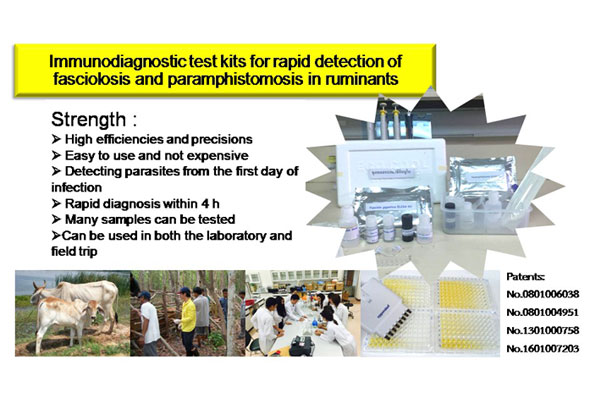Research Highlights

Drug Resistance Compound (High – Throughput Screening for Novel Compounds Contributed to Drug Resistance Malaria Parasites)
October 25, 2017
Reliability of 2 Different Positioning Protocols for Dual – Energy X – ray Absorptiometry Measurement of Body Composition in Healthy Adults
October 25, 2017Immunodiagnostic Test Kits for Rapid Detection of Fasciolosis and Paramphistomosis in Ruminants

Institute of Molecular Biosciences, Mahidol University

Fasciolosis (caused by Fasciola gigantica) and paramphistomosis (caused by paramphistome parasites) are the major diseases infecting domestic and economic animals, i.e. cattle, buffaloes, goats and sheep, in the tropical regions of Asia, Africa, aslo in Australia, eastern Europe and Russia, which results in major economic losses in agriculture. Moreover, liver fluke infection in humans is also recognized by the World Health Organization as a major public health problem.
The current diagnosis of fasciolosis and paramphistomosis is based on the microscopic detection of the fluke’s eggs in the feces. However, this can onl y be detected at 13 to 14 weeks after infection when the major damage to the host’s hepatic and digestive system has already occurred. Hence, antigen detection is considered to be a more reliable method for identifying animals with pre-patent or occult infection, which could not be detected by the usual parasitological test. Moreover, the antigen detection can give a more accurate current rather than past infection.
Our immunodiagnostic test kits (Fg-Ps ELISA Kits) (Patents No. 0801006038, No.0801004951, No.1301000758 and No.1601007203) showed high efficiencies and precisions for diagnosis of fasciolosis and paramphistomosis in ruminants.
Fg-Ps ELISA Kits could be used as the important diagnostic tools not only for the rapid detection of fasciolosis and paramphistomosis but also for the seroepidemiological screening of ruminants from different regions, which in turn could contribute to the monitoring and control of the disease. Hence, the discoveries of efficient immunodiagnosis are essential for the detection, monitoring, for the early treatment with drugs, and for sustainable preventive measure from the disease.
• The Best Presentation Award NSTDA Investors’ Day 2017
• The 25th Anniversary TRF Pitching Award 2017 Innovation to Thailand 4.0
• Young Parasitologist Award 2016
• SAADC2015 Young Scientist Award
• TRF-CHE-Scopus Young Researcher Award 2014 Life Sciences & Agricultural Sciences
Intellectual Property : Patents No. 0801006038, No. 0801004951, No. 1301000758 and No. 1601007203
Assoc. Prof. Dr. Panat Anuracpreeda
Institute of Molecular Biosciences, Mahidol University
